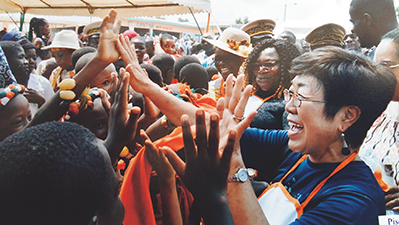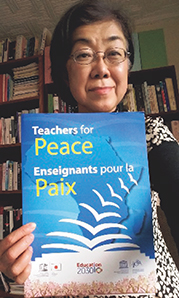Stories from the Field 8
Voices of Japanese Personnel Working in International Organizations
—Endeavors toward peacebuilding through education in Africa—

The author receiving a warm welcome from children on her visit to a school in Côte d’Ivoire at an AU African Day of School Feeding event (Photo: UNESCO-IICBA)

The author holding a poster of peacebuilding education conduced with cooperation from Japan (Photo: UNESCO-IICBA)
Addis Ababa, the capital of Ethiopia, is also known as the capital of Africa as it is home to many embassies and United Nations agencies, as well as the headquarters of the African Union (AU), and has the largest number of diplomats in residence on the continent. Addis Ababa is a highland city located 2,300 meters above sea level with a comfortable climate throughout the year, and in 1999, the United Nations Educational, Scientific and Cultural Organization (UNESCO)’s International Institute for Capacity Building in Africa (IICBA) was established there. The IICBA develops teacher policies, provides teacher training, and conducts relevant research and studies with the objective of strengthening teacher development in Africa. I have been serving as Director of the IICBA since April 2015. I believe that my work at the IICBA, which is to support teachers who are fundamental to the educational challenges in Africa, is my vocation, and I am working hard in that endeavor.
I have been engaged in education in Africa for almost 40 years, ever since I started working as a volunteer teacher in a rural village in Western Kenya in 1981 during my time at university. Through my experience working at a Zimbabwean NGO, JICA, the United Nations Children’s Fund (UNICEF), and UNESCO, I have visited almost every country in Africa. People sometimes say that I seem more African than Japanese, or that I am a Japanese African. When a job opening for the position of Director of IICBA was posted in 2014, I applied with low expectations of being selected, as previous directors had been former cabinet ministers of African countries. Fortunately, I was hired. I hope to consider the development of African nations as seriously as, or even more seriously than, the people of Africa.
Teachers play an essential role in increasing enrollment rates and improving the quality and suitability of education. The IICBA has provided training to and exchanged opinions with instructors at education faculties at universities and has worked with teachers’ unions to have teachers’ voices reflected in policies. With regard to science and mathematics education, which most teachers are not so proficient at themselves, IICBA carries out STEM (Science, Technology, Engineering, and Mathematics) education in collaboration with the Centre for Mathematics, Science and Technology Education in Africa (CEMASTEA), which has been strengthened by JICA’s assistance. In addition, IICBA has developed a Gender Responsive Pedagogy together with the Forum for African Women Educationalists (FAWE), an organization for promoting girls’ and women’s education in Africa. Our motto is that Africa’s challenges should be solved by Africa itself.
The biggest challenge facing Africa is ensuring peace and stability. Civil wars, armed conflicts with neighboring countries, conflicts arising from ethnic or religious issues, and other disputes hinder the development of the continent. Many African educators have a desire in their hearts to build peace through education. Japan’s assistance is making this possible. In order to build peace and to put an end to conflicts in African countries, where young people make up the largest percentage of the population, it is important that as many young people as possible embrace peace and work earnestly toward achieving it. Japan has been supporting peacebuilding and conflict prevention in Africa through the education of teachers in collaboration with UNESCO since 2017, and is currently providing training to approximately 5,000 young teachers from 25 African countries to improve their knowledge and skills on peacebuilding and mediation under educational programs and raise awareness of promoting peace and preventing extremism. The assistance under this project can be regarded as part of the New Approach for Peace and Stability in Africa (NAPSA), which Japan advocated for at the Seventh Tokyo International Conference on African Development (TICAD7) in 2019 (see also 8. Africa for details on NAPSA).
In the increasingly globalized world of the 21st century, I hope that talented young people in Japan will take an interest in developing countries, especially African countries. Many people in Africa have admiration and respect for Japan, seeing it as a country rising from the aftermath of World War II and huge earthquakes, as well as a country with knowledge and technology. While the African continent is geographically distant from Japan, its culture has much in common with Japanese culture. These similarities pleasantly surprise me in my work and daily life. Working at the United Nations is challenging as once you finish your task, you will have the next issue to deal with. I have heard that fewer young people in Japan want to engage in development cooperation work. However, I hope they will think about contributing to Africa from Japan all the more now that we are facing challenges from the COVID-19 pandemic.
YOKOZEKI Yumiko
Director
International Institute for Capacity Building in Africa, United Nations Educational, Scientific and Cultural Organization (UNESCO-IICBA)
<< Previous Page
Main Text | Reference Statistics | Reference Materials | Stories from the Field | Master Techniques from Japan to the World | ODA Topics
